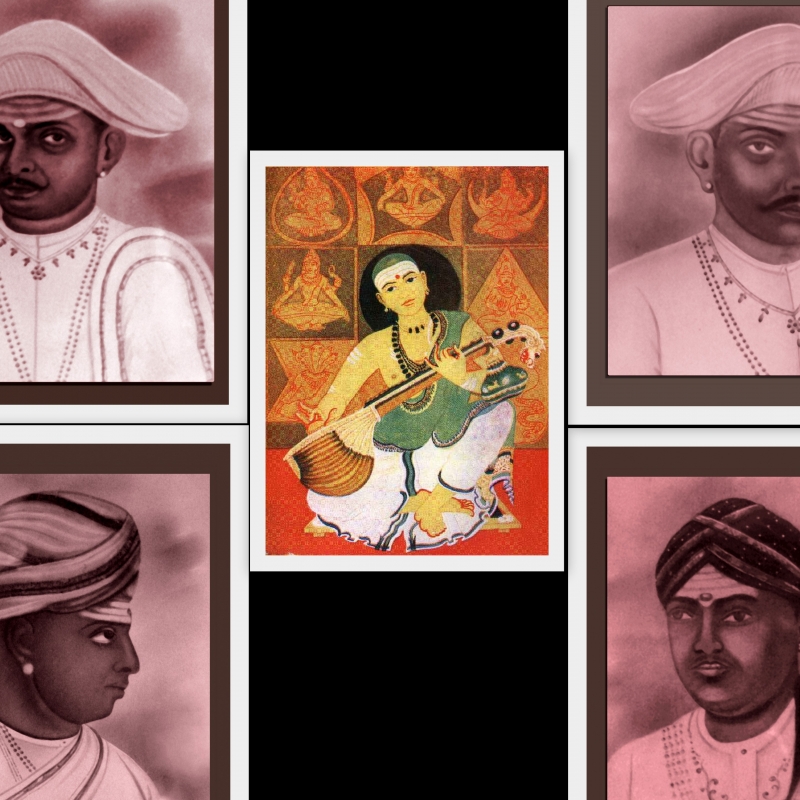Tanjavur Quartet- A brief introduction
Bharatanatyam that existed in the ancient times merely as a folk art form was formally codified into a structured performance in the eighteenth century by the four brothers from Tanjavur, well-known as the Tanjore Quartet─Ponniah, Chinniah, Sivanandam, and Vadivelu. They hailed from the dance lineage of the Brihadisvara temple of Tanjavur and were associated with the royal courts of Tanjavur, Tiruvananthapuram and Mysore. They were the first to formalise the performance pattern of bharatanatyam, and codify lessons called adavus (basic steps and the different categories of rhythm patterns) required for the same. They were the ones to plan and set the order of the different items of the repertoire in performance. The order they set is as follows. Melaprapti, alarippu, jatiswaram, sabdam, swarajati, chauka varnam, ragamalika, padam, javali, and tillana. They also composed several pieces for each category set to different ragas and talas (rhythm structure). The compositions were in Telugu, their mother tongue, and they addressed their family deities, Sri Brihadisvara and Brihannayaki, as well as the kings and ministers who patronised them and also the different deities whom they worshipped during their travels. All of these were presented by them in the performing art tradition, earning wide fame and reputation. They were invited by the royal patrons of Tiruvananthapuram and Mysore, as sitting doyens of art, to spread the art in those regions, while the king also popularised it by arranging performances in all the temples.
The four brothers formally trained in Carnatic music from the renowned Muttuswami Dikshitar of the Musical Trinity for seven years. They debuted in the royal court of Tanjavur. They composed several tanavarnams, kirtanas with their signatures: Guruguhadasa, Gurguhabhakta, and Gurguhamurti. After becoming well-versed in music, they trained in Bharatanatyam under their grandfather, Gangaimuthu and father, Subbarayan. They learnt the nuances of the theory and practice of the art, and thereafter formatted the performing pattern of the dance. After their debut, the brothers were praised and blessed by their guru, Muttusvami Dikshitar and were given the title of “Bharata Sreshtar”. The king honoured them with several gifts including a palanquin and appointed them as the musicians of the court.
Among the brothers, Ponniah composed several tanavarams, kirtanams, melaprapti, alarippu, jatiswaram, sabdam, swarajati, chauka varnam, ragamalika, padams, javali, tillana, daru, swarapadam, etc., some of which are dedicated to various deities and others were dedicated to Maratha rulers of Tanjavur like Serfoji Raja II Bhonsle, Pratapasimha Bhonsle and Amarasimha Bhonsle. Chinniah composed several similar pieces in praise of his patron, Krishna Raja Wodeyar, the King of Mysore. Sivanandam composed on Sivaji Raja and was well-known as a skilful teacher to many aspiring dancers.
Vadivelu, the youngest brother of the Quartet, served in the royal court of Travancore, under the patronage of Maharaja Swati Tirunal. His contribution was foremost in the field of instrumental music. Swati Tirunal honoured him with an ivory violin which still decorates the ancestral house of the Quartet in West Main Road, Tanjavur. Maharaja Swati Tirunal and Vadivelu together created pieces for dance and music, and also composed dance pieces with parallel renditions in Tamil, Telugu, and Sanskrit.
The four brothers were master-conductors (nattuvangam) of Bharatanatya recital and had a large student following. Celebrated nattuvannars, Chennai Nelliappa Nattuvanar and Pandanainallur Meenakshisundaram Pillai were students as well as sons-in-law of Mahadeva Nattuvanar, son of Sivanandam.
________________________________________________________________________________________
